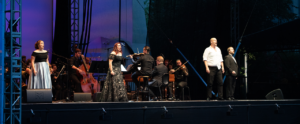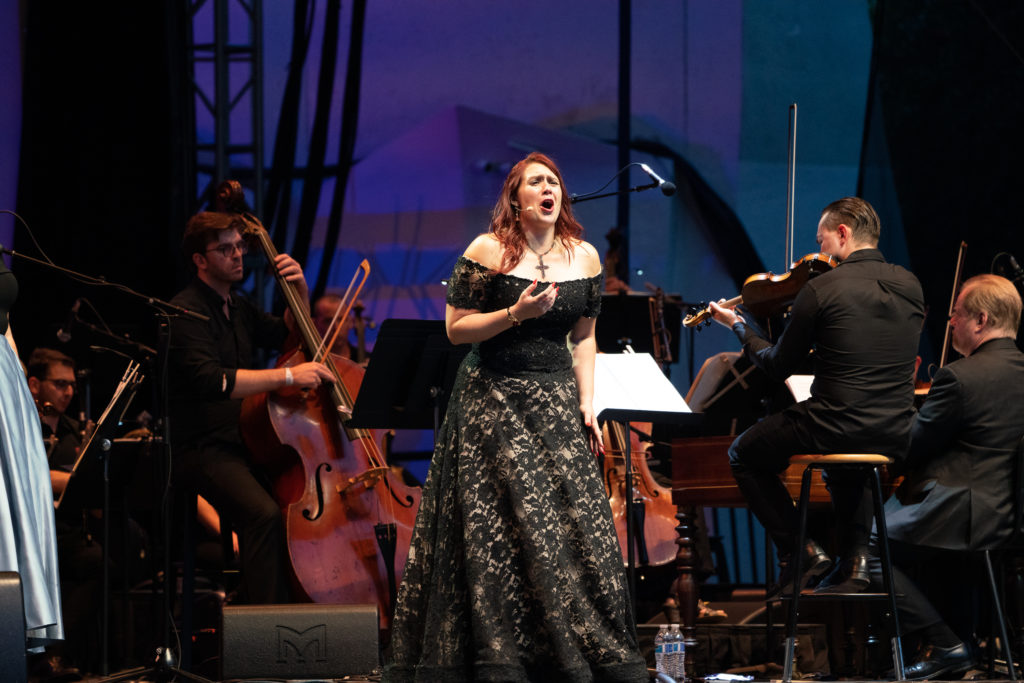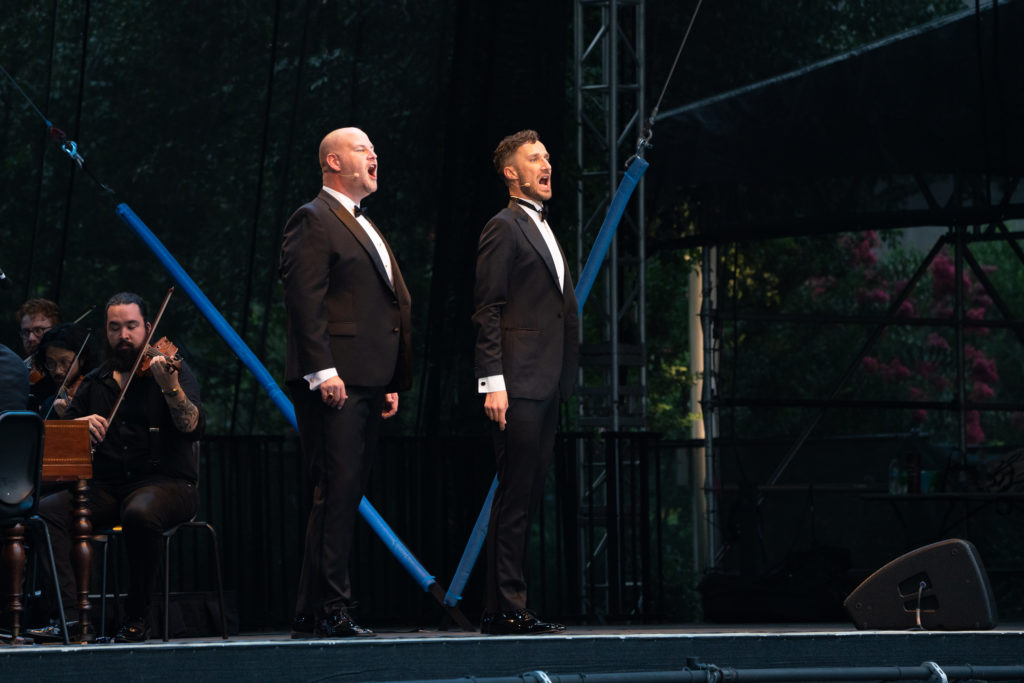
Teatro Nuovo 2021 Review: Il Barbiere di Siviglia
Will Crutchfield Leads Fantastic Return of Opera to Lincoln Center
By Chris RuelPhotos: Steven Pisano
This review is of the July 27, 2021 performance.
Opera is back in New York City, and it returned not as a big-budget production with gargantuan sets, light shows, animals, and all the trappings of grand opera but as a humble outdoor, semi-staged presentation of Rossini’s beloved comedy, “The Barber of Seville,” put on by Teatro Nuovo, a company dedicated to authentic performances of both greater- and lesser-known Bel Canto operas.
What did I think of it? I’ll tell it to you straight up. Teatro Nuovo’s “Barber” was one of the best opera performances I’ve seen, knocking a few extravaganzas below the fold on my list of impactful productions. “Barber” crackled with verve, sparkled in the details, and delivered the laughs as each member of the young cast crushed their roles in this historic performance. Irony of ironies, this all took place at Damrosch Park, which sits in the literal shadow of the Met. While the big house next door tries to get its act together, Teatro Nuovo lapped them in their own backyard.
The person behind the successful re-entry of live opera into New York’s cultural scene is conductor, musicologist, and Teatro Nuovo founder, Will Crutchfield. When Crutchfield left Caramoor after 20 years to create Teatro Nuovo in 2018, his mission was to “raise the levels [of young singers] from ‘good’ to ‘superlative.’” (Opera News, June 2018).
Teatro Nuovo’s artists were indeed superlative both in terms of technique and stage presence.
Alongside achieving virtuosic command over the technical aspects of singing, Crutchfield believes that a singer’s development should include fostering a strong sense of agency. He wants them “… to be the ‘music director’ of their own aria,” he stated in the same Opera News profile.
Beyond a doubt, the cast took that notion to heart as agency was plainly on display. Each artist fully embraced and portrayed their characters in their own authentic way. For younger artists still working on their craft, it could be easy and tempting to find a portrayal they like and fall into mimicry. But at Teatro Nuovo, “tradition” be damned; and what constitutes “Barber” tradition anyway after 200-plus years of performances during which conductors, singers, and copyists added or subtracted notes, slurs, and dynamics as they saw fit? It doesn’t help that Rossini himself boosted the manuscript chaos by doing the same—interpolating a cadenza here, eliminating an aria there, recycling music from another of his operas here and there, etc.
The late Philip Gossett in his book, “Divas and Scholars,” states that when Rossini wasn’t lacing the margins of his manuscripts with snark, profanity, or self-congratulatory scribblings, he used the area to tell singers what he expected them to do when he opened space for their artistry. Gosset uses the autograph of “Il Turco in Italia” as an example, quoting one of Rossini’s annotations. “‘The composer leaves it to the art of Sig. Vasoli [the singer who first played the role of the Poet] to fill out properly this…’ at which point he drew an enormous fermata.” Rossini gave performers the same thing Crutchfield instills at Teatro Nuovo, agency.
It may sound counterintuitive to the idea of agency, but Teatro Nuovo used constraint to foster creativity by forbidding cast members from borrowing ornamentation; the fioritura had to be crafted by the singer, not taken from someone else. As such, I couldn’t wait to hear what the singers came up with during those improvisational moments because I knew it would be fresh and full of life. The turns and roulades like rides on a newly redesigned rollercoaster, stylistically familiar, but with a lot of new thrills.
“Barber” à la 1816
Since “Barber” is such a well-known work among opera-goers, I won’t go into detail about the plot, but for any who are unfamiliar with the story here’s a very brief synopsis. The opera recounts the exploits of Count Almaviva as he attempts to win the heart of Rosina, a young woman kept locked away by her overprotective and suspicious guardian, Dr. Bartolo. Bartolo intends to marry Rosina for her money, but his plans are thwarted by Seville’s sly factotum and barber, Figaro, who happily concocts ruses for Almaviva to outfox Bartolo. In the end Almaviva achieves his aim, marries Rosina and everyone lives happily ever after, or at least until the next installment when Almaviva and Rosina are not so thrilled with married life, but that story is retroactively left in the hands of Mozart.
“Barber’s” premiere at Rome’s Teatro Argentina on February 20, 1816, was a disaster. Two competing theories are posited as reasons behind the opera’s initial poor showing. One states that Giovanni Paisiello, whose standing among early 19th century Italian opera-goers was at its height, grew livid over Rossini’s entry into the world of Figaro. Suddenly, Paisiello had competition. It was his operatic treatment of Beaumarchais’ straight play that was the most popular at the time.
Whether the composer egged them on is speculative, but Paisiello partisans may have arrived at the theater with a pocketful of hate towards “Almaviva, o L’Inutile Precauzione (Almaviva, or the Useless Precaution)”—Rossini deliberately titling it such to distinguish it from Paisiello’s “Barber.” Unintended comedic moments didn’t aid the performance, either. A cat made its way onto the stage and interrupted the Act one finale (A friend of Paisiello, perhaps?).
The second theory is more mundane and more probable though less juicy. Legend has it that Rossini wrote “Barber” in a mere 13 days, and the first performance was pulled together quickly as well. Under such circumstances, things are bound to not go as planned, especially in the world of live theater. Any kinks big or little must have been worked out because during the same run, the show became a hit.
Teatro Nuovo’s attempt to reproduce that 1816 premiere—minus the cat and whatever else may or may not have occurred—worked. The orchestra played period instruments and was led by Primo violino e capo d’orchestra Jakob Lehman, and Maestro al cembalo Will Crutchfield, playing an 1804 London Astor Fortepiano. So, there was no conductor, which holds true to opera performances in Italy during Rossini’s time.
There’s nothing terribly revolutionary about those artistic decisions, but what about casting a bass as Figaro? That’s different. According to Crutchfield’s program notes, baritone wasn’t a separate category when “Barber” was written. Figaro’s part isn’t higher than that of Bartolo or Basilio, because they all sit in higher in the voice to begin with. Here’s what I liked about this choice; besides it being performed with historical accuracy, it made Count Almaviva stand out like a beautifully played trumpet. The casting of the bass parts was so well done, I could close my eyes and know who was who with ease.
The Experience
Because the performance took place outdoors, COVID mitigation efforts didn’t include mandatory masking. I’d say there was 50/50 split between masked/unmasked audience members, and those who wore masks reserved them for moving about or speaking with others. Teatro Nuovo staggered arrival times to prevent a choke point at the entrance, and audience members sat in “pods” of two, with each pod six feet from its neighbors. The aforementioned brief gusts of wind cleared the miasma of a late-July day in New York City, leaving in its wake a splendid evening full of fresh air.
There were a few empty seats, and I expect attendance at events to continue in this vein. People are worried, and rightly so. The pandemic is still with us even though the horrific levels of illness and death in the New York Metro area have dropped far below what residents experienced 16 months ago. The collective trauma remains, and I can’t fault people for being reticent about jumping into a crowd.
The singers and orchestra were amplified. (Gasp!) Yes, one of the special things about opera is the power of the human voice sans microphone, but when competing against city busses, emergency sirens, and normal urban noise pollution, it simply couldn’t have been done any other way.
It reminded me that what we experience at performances today differs greatly from that of the 18th and 19th might include a turn at the gambling tables, an illicit liaison, and sorbet during the throwaway sorbet aria. Business deals, gossip, and intrigue abounded as the performers did their thing to a half-attentive audience. So, the ambient noise wasn’t bothersome when placed in historical context and this performance was all about presenting “Barber” as it was.
I listened to the surrounding comments, with many expressing astonishment that a blaring siren did not distract the singers. If you can perform as part of a wild Bel Canto sestet or stretta, I don’t think distraction is an issue. And whether it be a cat, a stiff breeze blowing across microphones producing a thunder-like sound, or a passing firetruck, part of the fun of live theater is the unexpected.
The stage itself was typical of an outdoor venue, with lighting and a color-shifting screen behind the orchestra on which the supertitles were displayed. Singers entered and exited via ramps in the wings. It was very simple, placing the audience’s attention squarely on the music.
Individual Performances
What could have devolved into park-and-bark, didn’t. The stand and sing approach arises not just from a lack of agency but also from young singers (or any) having too tight a focus on technique, rather than on the holistic performance. Things didn’t go that way. As Figaro put it, “… sui maccheroni il cacio v’è cascato (The cheese has fallen into the macaroni.).” In other words, because of Crutchfield’s vision for transforming talented singers into high-caliber artists, the cast was ready to deliver a fantastic outcome.
The singers brought their A-game and in doing so, kept me at the edge of my seat.
Leading the cast as Count Almaviva was tenor Nicholas Simpson, playing a crafty Count who fully buys into Figaro’s machinations. Simpson’s drunken soldier routine was comedic without falling into slapstick or exaggerated drunken gestures. His opening cavatina, “Ecco ridante in cielo,” was full of electrifying ornamentation and possessed brassy strength. The opening cavatina is not only technically difficult but requires the tenor to hit it somewhat cold, even after warming up prior to taking the stage.
The canzone “Se il mio nome,” was handled with delicacy, showing Simpson’s fine ability to color his line with soft passion.
Contrast this to the lightning-fast fireworks of “Cessa di più,” and you’ve seen a fantastic young tenor at his best, combining compelling acting with technical virtuosity.
Mezzo-soprano Hannah Ludwig sang Rosina. Ludwig has a stunning, robust lower range which she dipped into frequently and to great effect. And while Rosina is a young woman, she’s no Gilda, powerlessly locked up and doomed. Ludwig’s voice quality reinforced this dichotomy, demonstrating aurally that Rosina is a take-charge woman who will win her “Lindoro,” the penniless student with whom she’s fallen in love. Of course, Lindoro is the Count in disguise.
The best description of Ludwig’s Rosina is spunky. She’s a fighter who champs at the bit to be free of the old coot, Don Bartolo. For her showcase cavatina, “Una voce poco fa,” Ludwig’s fresh ornamentation was exciting, taking advantage of the many opportunities Rossini provided for his Rosinas to shine. Overall, she breathed new life into a standard, infusing it with charming determination.
There are singers who interpolate Rosina’s Act two aria, “Contro un cor che accende amore” into another showcase piece. I agree with conductor Joseph Rescigno’s assessment in his book, “Conducting Opera,” that this isn’t a good path. The aria is marked maestoso, and that’s how it should be sung. This is one aria in which Rossini does not go crazy with fermatas. There are plenty of opportunities for Rosina to go full throttle within other numbers, and to me, the score is clear—sing the notes written and keep it majestic. Ludwig did exactly that while using the few spaces Rossini left open to keep it interesting.

In the role of Figaro was Hans Tashjian, who delighted the audience, especially when his character is exasperated by turns within the intrigue that could bring the whole escapade down on his head. Tashjian was a take-charge Figaro and a nice complement to Ludwig’s strong Rosina.
Comedy is all about timing and delivery. Tashjian didn’t go with slapstick, which can be easy to do. Instead, his Figaro is a veteran schemer out to make a buck, and when that was threatened, the snark, the sighs of annoyance, and the rolling of eyes began.
Remaining true to the score, Crutchfield opened “Largo al factotum della città,” pianissimo, as indicated, which is a twist away from what’s become traditional. Doing so makes the “Rossini crescendo” even more potent where it occurs in this famous cavatina.
Throughout the opera, and this goes for all the artists, diction was clear. There are several big patter pieces in the opera, the cavatina “Largo al factotum,” and the duet “Numero Quindici.” With so many notes flying, things can get muddy, particularly if the conductor’s tempi is too fast, which forces the singer to cut notes to keep up. Crutchfield and Lehman kept things moving without sacrificing notes. After that, it was up to the singers to keep the words sharp as a tack. Tashjian accomplished this wonderfully in both his famous cavatina and the duet with Almaviva.
One of my favorite lines in “Barber” is Figaro’s repetition of the phrase “Guarda Don Bartolo,” in the Act one finale sestet, “Fredda ed immobile.” I enjoy that morsel most when it has a fun little bounce, with the singer punching every syllable. Figaro is reveling in the shock elicited by Count Almaviva after the Count identifies himself to the police in front of Bartolo, Rosina, Basilio, and Bertha to avoid being arrested for drunkenness. Tashjian brought the bounce, spotlighting a moment of mischievous, childlike glee.
In the role of Doctor Bartolo, Scott Purcell presented a perpetually flummoxed character who knows something is up but every time he believes he’s figured things out, Figaro or Rosina outsmart him. Throughout the opera, Purcell ratcheted up Bartolo’s frustration at the situation; he simply can’t catch Figaro or Rosina in the act or trip them up, though he comes so close. Drat! While I felt little sympathy for Bartolo, I found Purcell’s portrayal enormously entertaining.
It’s near impossible to miss the irony of Bartolo’s showcase aria “A un dottor della mia sorte,” as he pompously informs Rosina of how smart he is and that if she’s trying to fool him she needs to up her game. Of course, we know Bartolo is being played like a fiddle by Rosina and Figaro, and they know it too, making the aria even more delicious. Fast forward to the Act one finale sestet, and you can see why I find Figaro’s taunting of Bartolo quite humorous. The joke’s on you, Dr. Bartolo.
Don Basilio, Rosina’s shady music tutor, played by Daniel Fridley, colored his lines in “La calunnia,” with menace. Fridley’s stentorian bass had a splendid dash of creepiness to it, quite appropriate for an aria about the joy of spreading slander about your enemies. Between the three basses, Basilio has the highest notes to sing, and Fridley took them on without fear.
Alina Tamborini, as Bertha the maid, was a force as her soprano voice skyrocketed over the top of the Act one finale stretta, “Ma signor.” The trouble with sopranos appropriating the role of Rosina is that it messes with the balance of the voices. You end up with two competing sopranos rather than the mix Rossini intended.
I’m glad Crutchfield kept Bertha’s aria, “Il vecchiotto cerca moglie.” The aria is often omitted, and it would have been a shame not to have given Tamborini the chance to shine. Knowing Crutchfield’s modus operandi, I would have been surprised if he had cut it because its far from being a throwaway, even when crunched for time, which Crutchfield was (Damrosch Park closes at 10:00 p.m., no exceptions, even for opera). Instead, a few recitatives were trimmed or cut to ensure the heart of Rossini’s masterpiece remained intact. Rossini had something for Bertha to say musically, so bravo to Crutchfield for not jettisoning the number.
Fiorello, sung by Kyle Oliver, was well-played and opened the show strong. Fiorello is the first principal character the audience encounters. If the singer stumbles or is low energy, the rest of the cast needs to get the show back on its feet quick. Oliver is a solid singer with excellent comedic timing. It’s no wonder why he was chosen to cover Figaro in case Tashjian needed to drop out.
Welcome Back
I’ll end with this quote from Susan Rutherford’s essay in “The Cambridge Companion to Opera Studies.” Rutherford is Emerita Professor of Music at the University of Manchester and I believe she’s on to something very apropos to Bel Canto and quite timely, considering the past 16 months in which live performances were few and far between, if they happened at all.
“Our pleasures in opera’s melismatic fragmentation or occlusion of the word may stem from our earliest memories of shared communication with our carers. Rather than fuelling anxiety, these sounds perhaps recall a nurturing environment and the processes through which we ourselves discovered language—even of a time when our voices soared freely to the same heights as that of a soprano.”
Welcome back to New York, opera. We’re all in need of some nurturing and caring through the sound of the human voice. And “bravo” to Teatro Nuovo for making the first one top-notch.



